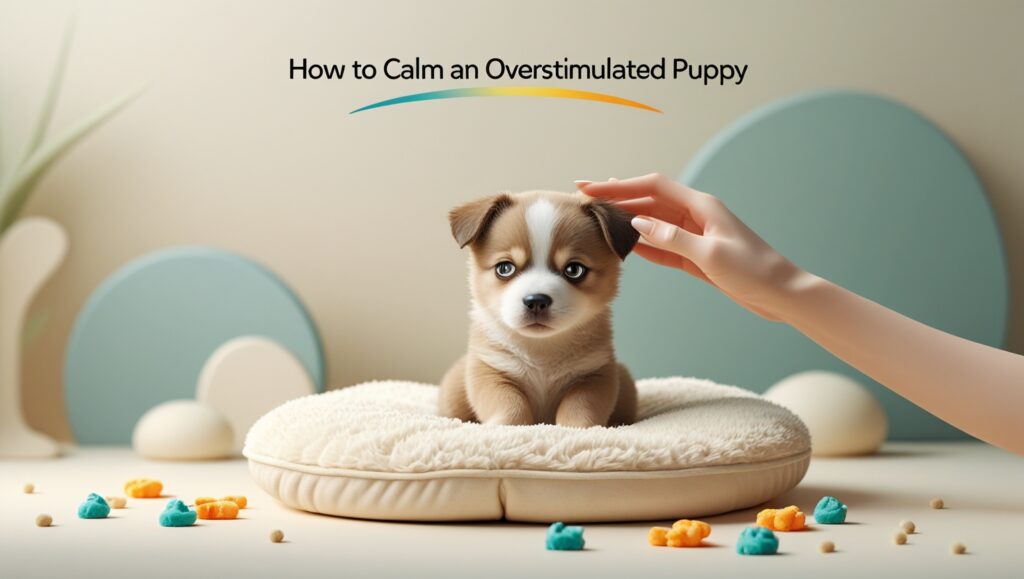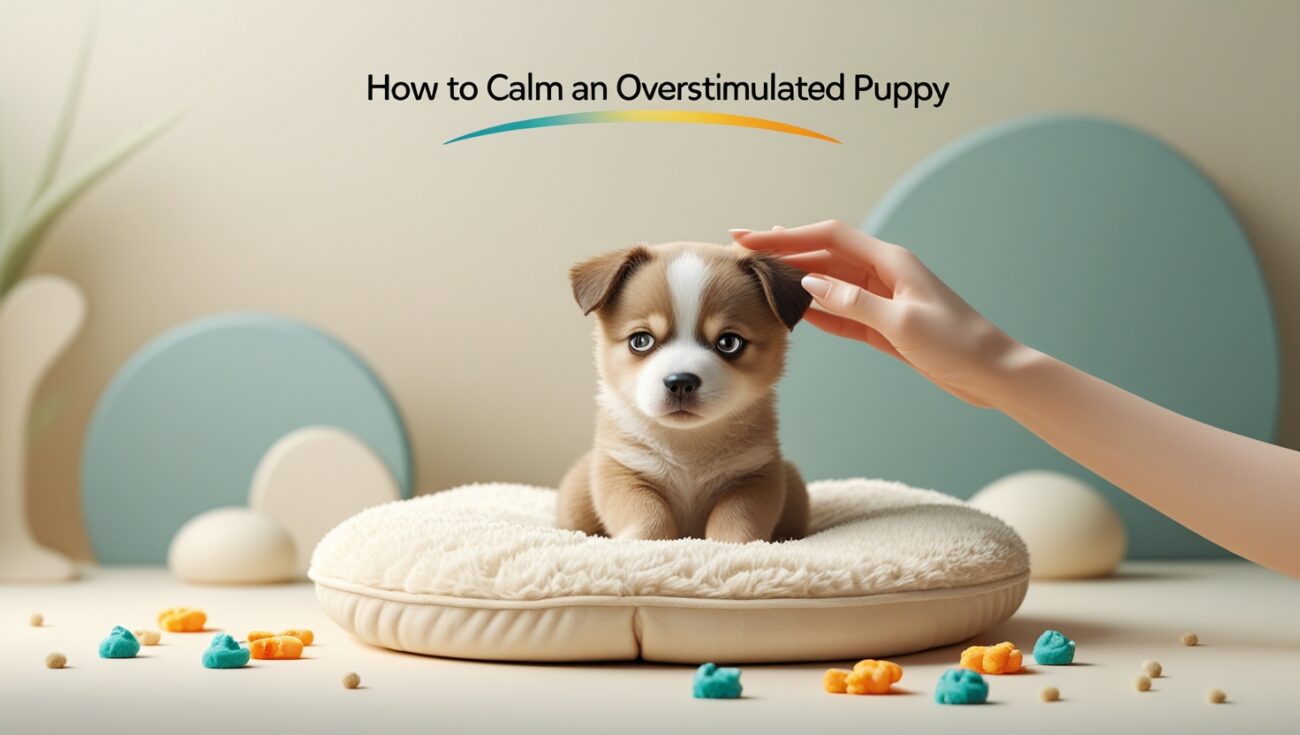How to Calm an Overstimulated Puppy
If you’ve ever had an overstimulated puppy, you know how challenging it can be. I remember when my puppy would get so wound up — zooming around the house, biting, barking, and refusing to settle down. I tried more walks and longer play sessions, but they didn’t help. That’s when I learned that the key to calming an overstimulated puppy is actually mental stimulation — not just physical exercise.
In this post, I’ll show you exactly what worked for me to calm my puppy quickly — and how you can use brain training to help your puppy learn to settle. If you want the full program that worked wonders for us, here’s my personal link:
Brain Training for Dogs — Click here to check it out

Table of Contents
What Causes Overstimulation in Puppies?
Puppies are full of energy — and they’re also learning how to process all the new sights, sounds, and experiences in the world. Sometimes, when too much is happening, they become overstimulated — unable to calm down or focus.
Common signs of an overstimulated puppy:
- Zoomies (crazy running around)
- Barking and whining
- Excessive biting or nipping
- Jumping
- Difficulty settling or resting
At first, I thought my puppy just needed to “burn off” more energy — but more physical exercise actually made her more amped up! What finally worked was focusing on mental stimulation.
How Brain Training Helped My Puppy Calm Down
When I started adding brain games to my puppy’s day, everything changed:
- She learned how to focus and control her energy
- Zoomies became less frequent
- Nipping and biting decreased
- She was able to settle and rest more easily
That’s because mental fatigue is far more calming than physical exhaustion alone.
The Best Brain Games I Used
1. Scent Work
I hid treats in a snuffle mat or around the house. Scent games are calming and help puppies use their nose — which is naturally soothing.
2. Puzzle Toys
Puzzle feeders gave my puppy something to focus on and work out, instead of bouncing off the walls.
3. Engagement and Focus Games
I used “watch me” and other engagement games to teach my puppy how to tune in and calm down in overstimulating situations.
4. Simple Trick Training
Short sessions of positive trick training worked my puppy’s brain and built patience — so she could settle afterward.
If you want a full plan of the best games for this, this is what I followed:
Brain Training for Dogs — Full Program Here
The Results
After adding daily brain stimulation, my puppy became much more balanced:
- Fewer out-of-control moments
- Less nipping and barking
- Able to calm herself faster after playtime
- Better behavior in new environments
And the best part? It didn’t take hours. Just 15–20 minutes of the right mental work made a huge difference.
Final Thoughts
If you’re struggling with an overstimulated puppy, the solution probably isn’t “more exercise.” Instead, try working your puppy’s mind — you’ll be amazed how quickly they learn to calm down.
If you want an easy plan to follow, this program is what helped me the most:
Brain Training for Dogs — Click here to get started
Trust me — once your puppy’s brain is engaged the right way, those wild, overstimulated moments become fewer and fewer.
Before I discovered how powerful mental stimulation could be, I kept trying to “wear out” my puppy with more and more play. But it only left her more hyper and harder to calm. The moment I shifted my focus to working her mind, things finally clicked.
One of the biggest surprises? Puppies don’t always need more exercise — they need better quality stimulation. Short bursts of brain games can calm a puppy far more effectively than a long walk.
Another important tip is to recognize the early signs of overstimulation. Once you know what to look for, you can intervene sooner — before your puppy spirals into an uncontrollable state.
I also found that structured mental work helped improve my puppy’s impulse control. She became less likely to jump on people, bark excessively, or get “mouthy” when excited.
If you’re unsure where to start, this is the program that gave me the structure I needed:
Brain Training for Dogs — Full Program Here
It walks you through everything step-by-step — so you don’t have to figure it out on your own.
Another thing I loved? These games helped build my puppy’s confidence. An overstimulated puppy is often unsure or overwhelmed. Teaching simple brain games gave her a clear purpose — which helped her feel more secure.
Even just adding 10–15 minutes of scent work or puzzle play made a noticeable difference in how calm and settled my puppy was for the rest of the day.
And because mental fatigue is healthier than physical over-exhaustion, my puppy was able to rest more deeply and recover faster after playtime.
If your puppy tends to act wild in the evenings — often called the “witching hour” — brain games can help prevent that. A short mental workout before dinner helped my puppy avoid those chaotic energy bursts.
I also noticed that adding brain games improved my puppy’s ability to relax when left alone. She was less anxious because her mind was being worked in positive ways.
Many of my friends with new puppies saw the same results when they followed this plan:
Brain Training for Dogs — Click here to check it out
It’s truly one of the best things you can do for a young dog — especially one that’s prone to overstimulation.
And remember — the goal isn’t to eliminate energy, but to channel it in healthy ways. That’s what mental stimulation does so beautifully.
If you’re ready to help your puppy become calmer, more focused, and happier, give this method a try. You’ll be amazed how quickly things change.
Here’s the program that worked for me — and I know it can help you too:
Brain Training for Dogs — Full Program Here
Once your puppy starts using their brain the right way, you’ll finally enjoy more peaceful, balanced days — and nights!

